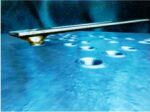Nano Punchcards from IBM
Published by marco on
 IBM Research News has recently announced their latest new ‘world record’ for storage density. IBM’s ‘Millipede’ Project Demonstrates Trillion-Bit Data Storage Density says:
IBM Research News has recently announced their latest new ‘world record’ for storage density. IBM’s ‘Millipede’ Project Demonstrates Trillion-Bit Data Storage Density says:
“Using an innovative nanotechnology, IBM scientists have demonstrated a data storage density of a trillion bits per square inch — 20 times higher than the densest magnetic storage available today.”
The breakthrough involves a return to mechanical storage, reminiscent of the punchcards of old, but this time, the card is “a thin plastic film” and the hole is only “10 nanometers (millionth of a millimeter) in diameter”. Since the holes are so small and embedded in a polymer, the same heat that created it can also be used to seal the holes back up, creating a rewritable medium.
The New York Times has the article A New System for Storing Data with more information about pros and cons of the new system.
“.[H]ard disks store data in what is essentially a vast array of tiny magnets. But if a magnet is shrunk too small, vibrations of heat can make the magnet flip, destroying data.”
The plastic, non-electromagnetc storage suffers no such problems and the latest model is capable of reading and writing a single nanodot at a time. However, “Millipede still suffers a big drawback of mechanical systems. Reading and writing data with a single silicon tip takes about 1,000 times as long as with hard disks.” To address this, researchers use a brute force method that simply uses multiple read/write tips:
“[T]he research team is now building a prototype, due to be completed early next year, which deploys more than 4,000 tips working simultaneously over a 7 mm- square field. Such dimensions would enable a complete high-capacity data storage system to be packed into the smallest format used now for flash memory. … While flash memory is not expected to surpass 1-2 gigabytes of capacity in the near term, Millipede technology could pack 10 − 15 gigabytes of data into the same tiny format, without requiring more power for device operation.”
This would allay speed concerns, increase redundancy (magnetic hard drives have just one read head), and pack information into a much smaller space. Millipede should also be more shock-proof than some of the larger hard-drives available today. The researchers are quick to note that the technology is still “years from becoming a commercial product”, but “It’s in a state where all the big problems are solved”.